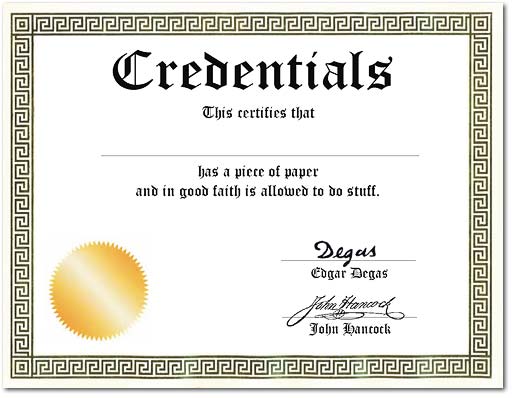I had a new experience this week – another trainer tried to “credential shame” me. The background: I use my gym’s platform to celebrate our members and to educate members and non-members alike. Even if you don’t go to my gym, I hope you learn something from our content. Last Tuesday, we posted a reel about wide-stance box squats. In a nutshell, if you’re competent with basics, you can manipulate your stance and loading to target different muscles, take your joints through different ranges of motion, etc.
Random guy messages me through IG and asks about it. I’m happy to delve into the nitty-gritty any time, and it seemed like that’s where this conversation was headed. It quickly became clear the guy didn’t approve of messing with stance and was trying to beat me in an argument. After discussing joint angles and leverages, this gem of an exchange occurred:
Rando: “Stop trying to talk physics, you’re a CrossFit coach. You don’t even have your CSCS.”
Me: “You’re right, I never took that test. Forgive me, it was silly of me to assume that my bachelor’s in engineering from Yale and my master’s in it from Villanova qualified me to discuss basic mechanics.”
Rando: <blocked me>
Why do I bring this up? Because ultimately, credentials are irrelevant in the fitness world. They make you insurable, and they show that you can pass a test. Heck, I’ve accumulated somewhere around 30 credentials (I stopped counting, because WHO CARES!?), and some of them didn’t even require a test. At the end of the day, all that really matters is, can you help your clients solve their problems and achieve their goals? That’s it, that’s the whole game.

Some of the best coaches I know have the fewest credentials. One of them struggled at test taking and had to take the same test 5 times. Conversely, I’ve known a few coaches with cash to burn who took every cert they could get their hands on. They were great with regurgitation, so they passed the test. When it came to actual training, they could mimic what they were taught. The minute they encountered a problem, they were helpless and couldn’t fix the client’s issue.
The fundamental principles of strength training are well known. Cardio, too. Conditioning, arguably less so. Methods don’t matter as long as they follow these principles. There are numerous approaches that will work, it’s a matter of finding one that your clients enjoy and that works for you too. Do I think my approach is the best? Damn right I do, but I know that it isn’t going to resonate with everyone. Jim Wendler’s 5/3/1 program is one of the most popular strength training programs out there because it is simple to follow and doesn’t require much time to complete. And, most importantly, you can get really strong by following it. The downside? It can be fairly boring and repetitive. BUT, it works.
Which brings us to the main point of this rant article: it’s the soft skills that matter most – empathy and communication. Can you get your clients to buy into your program? Do they understand HOW it will help them achieve their goals? Are you checking in with them to make sure they are compliant? If they’re not, are you able to problem solve, adjust, and help them work around roadblocks? Are you actually helping them work towards their goals, or are you making them do stuff because YOU like it? The answers to these questions determine whether you have a good coach or not. The program is secondary – a mediocre program followed with 100% compliance will yield better results than a phenomenal program followed with 50% compliance.
Seriously, credentials don’t matter. I’m all for continuing education and I encourage my staff to keep learning. But this is just to expand their toolboxes so they can better problem solve. At the end of the day, it’s the human connection that matters most. See you in the gym.
Further Reading:
What Makes a Coach?
What Does it Take to be a Coach?
